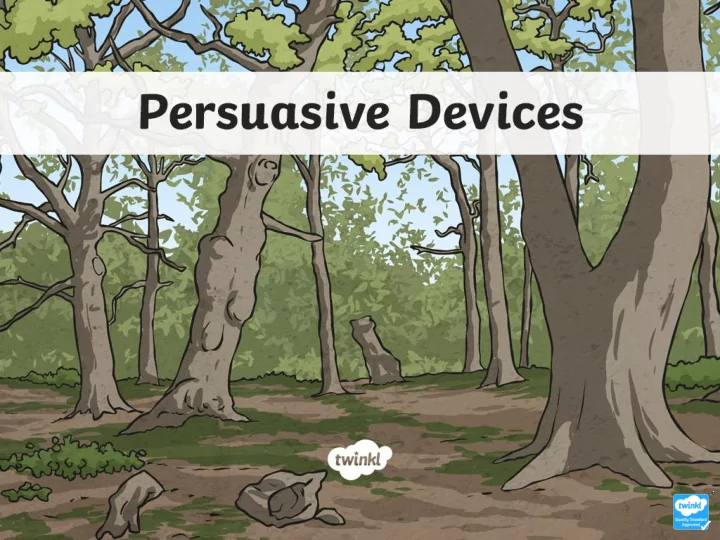

Persuasive Devices Persuasive devices are language features typically used in a persuasive piece of text. A written persuasive text is intended to persuade the reader to think in a particular way. This can be achieved by using persuasive devices/techniques.
Persuasive Devices Go through A FOREST to be heard, get noticed and to draw in the reader to your writing.
Persuasive Devices A lliteration F acts O pinions R R epetition (& hetorical Questions) E E motive Language (& xaggeration) S tatistics T hree (rule of)
Alliteration Alliteration is the stylistic device of using a series of words that begin with the same sound. W alking w ombats w obble. A p articularly p erfect p izza!
Alliteration Can you think of an alliterative phrase which includes an animal or pet? Think about how they act, what they look like, how they move, sounds they make, their environment etc. For example: The cute cuddly koala came close quickly.
Facts A fact is something which is truthful and can be proven. Facts can be used to support a point being made. A triangle has three straight sides. FACT Cats have whiskers. FACT People need water to survive. FACT
Facts An opinion is someone’s point of view of/about something that is not based on fact or knowledge. A triangle has three straight sides. FACT Triangles are easy to draw. OPINION Cats have whiskers. FACT Cats are cute. OPINION People need water to survive. FACT You need to drink 2-3 litres of OPINION water each day to survive.
Facts and Opinions Discuss and list the facts and opinions relating to the pictures.
Repetition To repeat the same thing more than once. This can be done by repeating the words or sentence in the same way: Cats are the best ! They make great pets and are very friendly, cats are the best . or the meaning can be retained but stated in a different way using the same words: Cats are the best! They make great pets and are very friendly. You should choose a cat because they make the best pets.
Repetition Imagine you are trying to sell some cupcakes. How can you use repetition to get this point across? These cupcakes are delicious. Try repeating the words and then restating what you are saying in a different way.
Rhetorical Questions A rhetorical question is one that does not require an answer. Can you really afford to ignore this warning? $1 Will you let this bargain pass you by? How will you ever forgive yourself if you don’t buy this product?
Rhetorical Questions If you were trying to persuade the reader in a particular way, what rhetorical questions could you ask about this topic? People waste so much food.
Emotive Language Sometimes writers deliberately choose words to be emotive. Emotive language means words that create an emotion in the reader. How does this make you feel? What are the emotive words? After Christmas every year, there are thousands of abandoned puppies left to wander the streets, scared and alone. Only your support can rescue them.
Exaggeration A statement/information that is untrue or over the top. I could eat a horse I’m that hungry! I will explode if I am asked to do that again! The motorbike travelled faster than the speed of light.
Exaggeration Use the words below to create your own exaggerated statement. happy I was as happy as a pig in mud. bored I was so bored I could have died! Can you think of any other exaggerated statements you have heard used?
Statistics Factual data used to convince the reader. 95% of people agreed it was the best pizza they had ever tasted. 85% of children believe homework should be abolished. What data could you use if you were trying to persuade people to eat healthily?
Three (rule of) It is believed that a person is more likely to remember things if they are grouped in three. “ Stop , look and listen when crossing the road.” “ Stop , look and listen when crossing the road.” “ Stop , look and listen when crossing the road.” “Stop, look and listen when crossing the road.” 1 2 3 When using this in persuasive writing choose an order so the word having the biggest impact is at the end. Twinkl chocolate is smooth, velvety and tastes divine! Twinkl chocolate is smooth , velvety and tastes divine! Twinkl chocolate is smooth , velvety and tastes divine! Twinkl chocolate is smooth , velvety and tastes divine! 2 1 3
Three (rule of) Use the internet to search for ‘Rule of Three’ examples – how many do you recognise? homework
Recommend
More recommend